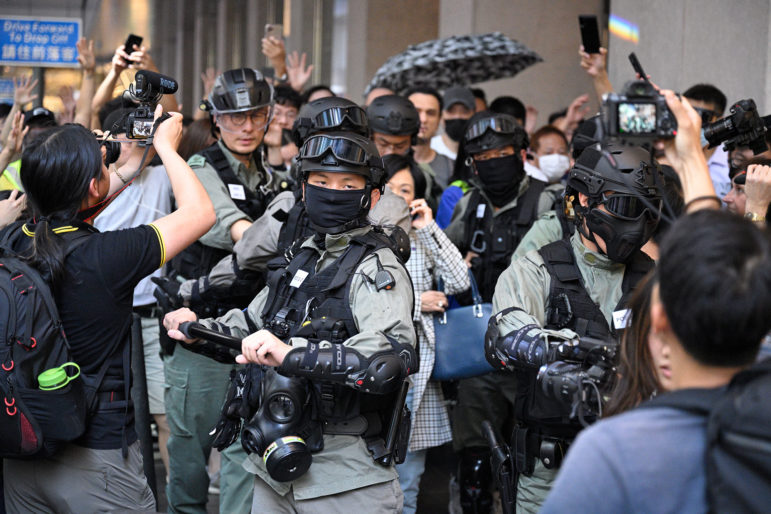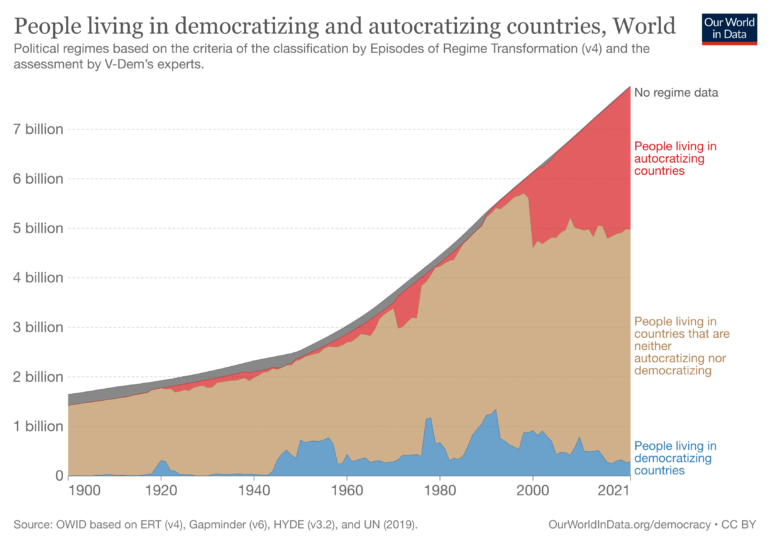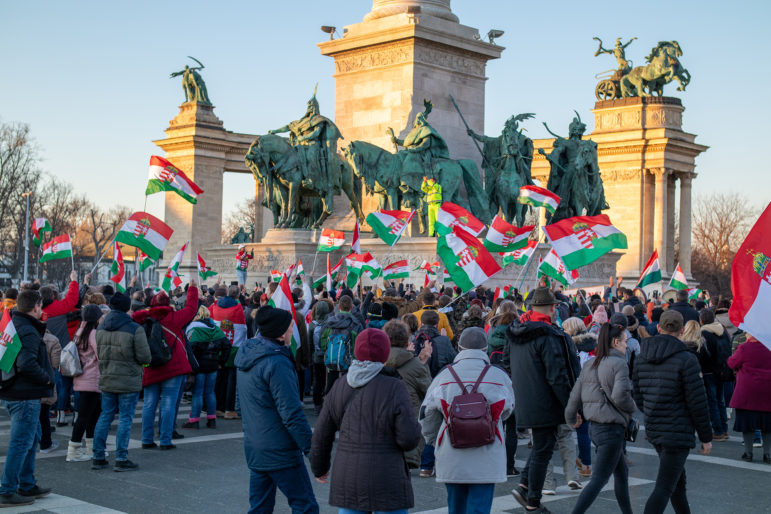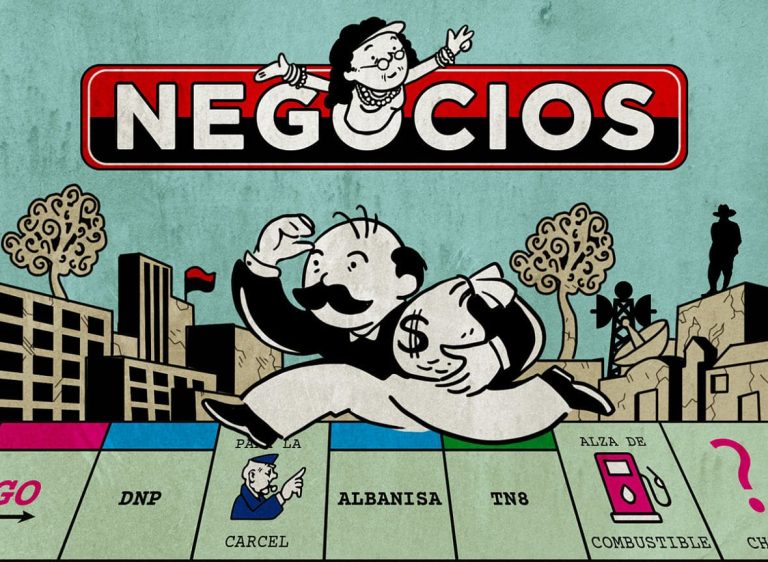

HONG KONG,Central,2019NOV25,in military thug tyranny dictatorship failed state,masked ferocious police without warrant card occupied and block the road,it made a chaotic social order & destroy city
Resources for Tackling Authoritarian Threats on International Day of Democracy
Independent newsrooms find themselves on perilous and shrinking ground as civil society and human rights organizations around the world mark International Day of Democracy on September 15.
Report after report, index after index, all reveal the same pattern: that democracy, globally, is in consistent and alarming decline, with a decade-long trend toward authoritarianism recently accelerated by populist and far-right politics, social media disinformation, and new laws that use COVID-19, xenophobic fears, or foreign funding as pretexts for further restrictions on civil liberties.
According to an Economist Intelligence Unit survey of 167 countries released this year, 54% of all people now live under either authoritarian rule or repressive “hybrid regimes,” while the portion of the world population living in “full democracies” has rapidly shrunk to just 6.4%. A handful of countries, such as Indonesia, became more democratic in 2021, but many more – including Tunisia, Mexico, Afghanistan, and several Latin American nations – saw their democratic ratings plunge.
Meanwhile, the Global State of Democracy Report 2021 — compiled by the International Institute for Democracy and Electoral Assistance — showed that three times as many countries were moving in an authoritarian direction than those that were trending democratic.
Following a high-water mark for democracy in 2005, US nonprofit Freedom House noted that “the present threat to democracy is the product of 16 consecutive years of decline in global freedom.” Without concerted action by democracy’s defenders, Freedom House warned, a “tipping point” toward a global autocratic model of governance could be reached.
Ahead of the International Day of Democracy, Dr. Bastian Herre, a researcher at the UK-based Our World in Data, produced striking data visualizations to show the historic severity of the trend.

Our World in Data has identified which countries are becoming less or more democratic using various datasets to measure levels of democracy. Source: Our World in Data / Creative Commons
Journalists are on the front lines in this historic struggle. Independent media and press freedom are tied inextricably to democracy and open societies. So it is no surprise that world press freedom is also at its lowest ebb this century. Attacks on journalists seem to come from every direction — physical, legal, digital, financial — while media owned by allies of autocrats actively undermine independently-minded media. According to the Reporters Without Borders 2022 World Press Freedom Index, the number of nations found to have a “good” press climate declined from 25 in 2013 to just eight countries in 2022. Their report also noted a dramatic, damaging rise in media polarization within countries, and warned that despotic regimes are “waging propaganda wars against democracies.”
Amid this backlash, to support our colleagues around the world, GIJN has produced a series of reporting guides, tip sheets, and webinars — both to define the anti-democratic challenges and to provide tips and tools for digging into authoritarian bad actors and defending against their attacks. We compile them below.
Elections Guide for Investigative Reporters
In response to the rise of disinformation and authoritarian manipulation of electoral processes around the world, GIJN produced a five-part guide to help watchdog reporters navigate and investigate abuses and dirty tricks within electoral campaigns. Based on interviews with more than a dozen veteran journalists and election experts, these chapters included a methodology for election scoops, the latest digging tools, and tips on preparation, backgrounding candidates, and investigating political messaging.
How to Fight SLAPPs and Harassment of Journalists
In a story originally published by the Media Development Investment Fund, Snezana Green outlined the journalism-chilling threat posed by SLAPP lawsuits (strategic lawsuits against public participation) and some of the strategies to counter them. A second piece described the increased use of these legal silencing tactics against journalists and strategies to counter their impact.
GIJN Webinars and Panels on Autocracy
- The plenary session at the 2021 Global Investigative Journalism Conference (GIJC21), titled “Autocrats, Oligarchs, and Kleptocrats — The Global Fight for a Watchdog Press,” is available on GIJN’s YouTube channel, as are the sessions below.
- A GIJN webinar on “How to Investigate Autocracy” features experts Masha Gessen, Lina Attalah, Nic Dawes, and Sheila Coronel.
- A panel on “How to Investigate Elections” includes veteran journalists Craig Silverman, Denis Teyssou, and Juliana Dal Piva, and features new tools to dig into political dirty tricks.
- Also see the rousing keynote speech at the 2019 GIJC in Hamburg — focused on disinformation and government attacks on reporters — delivered by 2021 Nobel Peace Prize laureate Maria Ressa.
Solidarity Among Global Investigative Journalists
Following the award of the Nobel Peace Prize to two investigative journalists in 2021, the plenary session of GIJC21 noted that citizens around the world were now counting on investigative journalists to help make a stand for democratic accountability. The very fact that the conference — hosted by GIJN — drew 1,668 investigative editors and reporters from a record 144 countries echoed the hope represented by the Nobel laureates. “The old world is dying, and the new world struggles to be born: now is the time of monsters,” said French outlet Mediapart’s Edwy Plenel, quoting Italian philosopher Antonio Gramsci. “And we are fighting the monsters.”
Vinod K. Jose, executive editor of The Caravan, India’s leading investigative magazine, added: “The answer to the attack on journalism is more journalism.”
As an example of accountability impact even in the most autocratic societies, the panel pointed to the successful investigation of alleged money launderer and businessman Alex Saab by four exiled Venezuelan journalists.
Why Journalists in Autocracies Should Report as if They’re in a Democracy
Journalists working within autocratic societies face a common impact problem, in which the corrupt officials and bad actors they expose — who are allies with authoritarian governments — are unlikely to face accountability for their misdeeds. However, in this GIJN story about a RightsCon panel, leading independent editors made this important point: that, where possible, these reporters should try to choose their stories and investigate as if their societies were democratic. Experts like Lina Attalah, editor of Egypt’s independent Mada Masr outlet, say this attitude helps reduce self-censorship while also keeping the bar high — and perhaps the flame of democracy alive — for their oppressed audiences.

Protestors in Budapest, Hungary, opposing Viktor Orban’s regime, which has steadily undermined press freedom and stifled opposition. Image: Shutterstock
Reporting from Exile Can Still Have Impact
Following similar flights from countries like Myanmar and Afghanistan, several independent Russian media outlets were forced into exile this year due to draconian anti-press laws. However, in a recent GIJN feature, a number of veteran exile media editors shared the tools and techniques that can help watchdog newsrooms reach and engage domestic audiences from abroad. These ranged from free censorship circumvention tools such as Psiphon to shortwave radio frequency changes and even daily reporting shifts matched to the audience’s time zone.
Lessons for Newsrooms Witnessing an Autocratic Slide
The recent experience of independent journalists in Hungary, under authoritarian president Viktor Orban, is particularly useful for reporters who are witnessing their own countries slide toward anti-press hostility and autocracy. In this recent piece, the editor of GIJN member Direkt36 not only shared the classic sequence of threats and attacks he and his colleagues experienced, but also detailed the “common mistakes that we all can avoid so as not to make our own situation worse.”
Investigating Mafia States and Kleptocracies
In an in-depth interview with GIJN’s David E. Kaplan, Drew Sullivan, co-founder of the Organized Crime and Corruption Reporting Project (OCCRP) described the challenges and approaches for investigating governments effectively run as criminal enterprises (mafia states) or as vehicles for self-enrichment (kleptocracies). Sullivan emphasizes the follow-the-money mantra for tracking entities that contract with these regimes, and the need to grow skills for digging into money laundering and the connections among autocrats. GIJN also published a comprehensive Reporter’s Guide to Investigating Organized Crime, including chapters on arms and drug trafficking, cybercrime, money laundering, mafia states and kleptocracies.
Since accountability, free speech, and informed electorates are central for free societies, independent media — and watchdog reporters, in particular — plays a crucial role in reclaiming this lost democratic ground, in partnership with civil society and human rights defenders. And — despite severe headwinds — the field remains vibrant, including a trend toward powerful collaborations among newsrooms, new nonprofit watchdog units in the Global South, and fast-growing disciplines, such as visual forensic reporting and citizen journalism. As Kaplan recently noted: “Despite all the challenges we face — lawsuits, intimidation, prison, physical threats, online harassment, lack of funds — investigative journalism around the world is alive and well.”
This story was produced as part of the Democracy Day journalism collaborative, a nationwide effort to shine a light on the threats and opportunities facing American democracy. Read more at usdemocracyday.org.
Are you a watchdog journalist under fire from an authoritarian government? Check GIJN’s Resource Center or visit our Help Desk for assistance.
Additional Resources
Why Journalists Must Hold Each Other Accountable to Protect Democracy
Document of the Day: 2022 World Press Freedom Index
GIJN’s Elections Guide for Investigative Reporters
 Rowan Philp is GIJN’s senior reporter. He was formerly chief reporter for South Africa’s Sunday Times. As a foreign correspondent, he has reported on news, politics, corruption, and conflict from more than two dozen countries around the world.
Rowan Philp is GIJN’s senior reporter. He was formerly chief reporter for South Africa’s Sunday Times. As a foreign correspondent, he has reported on news, politics, corruption, and conflict from more than two dozen countries around the world.









